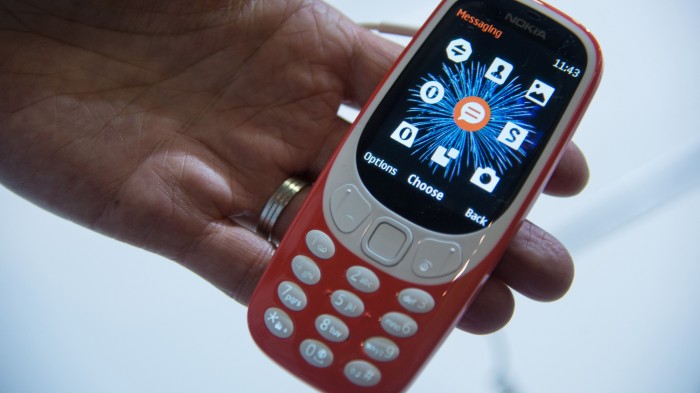Your Next Phone Could Be Simple, Not Smart

There’s a new fork in the cell phone road: go cutting edge, or choose to keep it simple.
At the annual smartphone jamboree that is Mobile World Congress in Barcelona, many manufacturers are showing off their most exotic new hardware in the hope of luring in customers with features that they never knew they wanted. But there’s also a discernible trend for embracing the simplistic and rebirthing the retro.
Perhaps the biggest technology being touted at MWC is the AI assistant. Apple and Microsoft have offered their versions, Siri and Cortana, for a few years. But Google’s Assistant has only so far appeared on the company’s own Pixel smartphone, and Amazon’s Alexa has largely found success in the home. Now, though, Google has announced that it will make Assistant available on many new devices, and Alexa will come loaded on Motorola’s new handsets. Telefonica is also planning to build its own AI assistant.
Elsewhere, as the cellular industry begins to gear up to push our data connections from quick 4G to blisteringly fast 5G, the Chinese smartphone manufacturer ZTE will show off a prototype device that demonstrates the capabilities of a gigabit network connection. In theory it could allow you to stream 4K video on your smartphone but, as the Financial Times reports (paywall), delivering the networks for real-world use will take some time.
There’s also no shortage of kooky innovation. Oppo reckons it can fit a zoom lens into the body of your regular phone by using some fancy optics. Sony has a projector to pair with your handset so that you can turn any surface into a touch screen, allowing you to leave the laptop at home. And Alcatel has a new take on the modular smartphone concept.
But there’s also a kind of techno-rebellion going on. Having licensed the Nokia brand last year, a company called HMD Global has now launched a series of new phones under the name: three anonymous-looking Android-based smartphones and a reissue of the legendary 3310. The original may well have been your first mobile phone, given that the BBC notes that it sold 126 million in its heyday. This time round it’s as simple as ever: there’s no 3G, no touch screen, and certainly no AI—but you can play Snake and the battery lasts for a month.
That’s not the only resurrection taking place. Following Blackberry’s exit from the hardware game, a Chinese smartphone manufacturer called TCL Communication has decided to license its name and build a new device for executives who still break into a cold sweat when asked to type on a touch screen. Yes, the new Android-based Blackberry lives up to its KEYone name—it comes with a full physical keyboard.
These throwback devices are certainly enough to pique the nostalgia. But it's hard to see the Nokia, in particular, gaining mass-market appeal, other than amongst older generations and digital detox fanatics who might prefer to cast aside a mobile Internet connection in search of a more peaceful life.
But there is another related trend that may gain some traction. The Wall Street Journal notes that LG has decided to eschew the industry standard of seeking new features for its gadgets, instead planing to prioritize utilitarian features like good quality screens and long battery life. That means that its new G6 smartphone is, according to the Verge, “solid, and surprisingly sensible.”
The argument being made by LG is that smartphones are plateauing. We all know what a smartphone is, what it does, and what we expect from it—and hardware advances aren’t really changing any of that anymore. Even last year’s iPhone demonstrated that to be the case. So, reckons LG, why not concentrate on simply perfecting the mundanities rather than showing off?
It remains to be seen if that’s a sensible way to sell phones. But it certainly sounds like a refreshingly simple idea that could make the phones in our pockets better—even if they aren’t cutting edge.
(Read more: Wall Street Journal, Guardian, Reuters, “5G Wireless Is Coming, and It’s Going to Blow You Away,” "When Smartphones Become Too Addictive Stylish Dumb Phones Offer a Respite," “Google’s New Pixel Phone Matters (But You’re Not Going to Buy It),” “In 2016, AI Home Assistants Won Our Hearts”)
Keep Reading
Most Popular
Large language models can do jaw-dropping things. But nobody knows exactly why.
And that's a problem. Figuring it out is one of the biggest scientific puzzles of our time and a crucial step towards controlling more powerful future models.
How scientists traced a mysterious covid case back to six toilets
When wastewater surveillance turns into a hunt for a single infected individual, the ethics get tricky.
The problem with plug-in hybrids? Their drivers.
Plug-in hybrids are often sold as a transition to EVs, but new data from Europe shows we’re still underestimating the emissions they produce.
Stay connected
Get the latest updates from
MIT Technology Review
Discover special offers, top stories, upcoming events, and more.